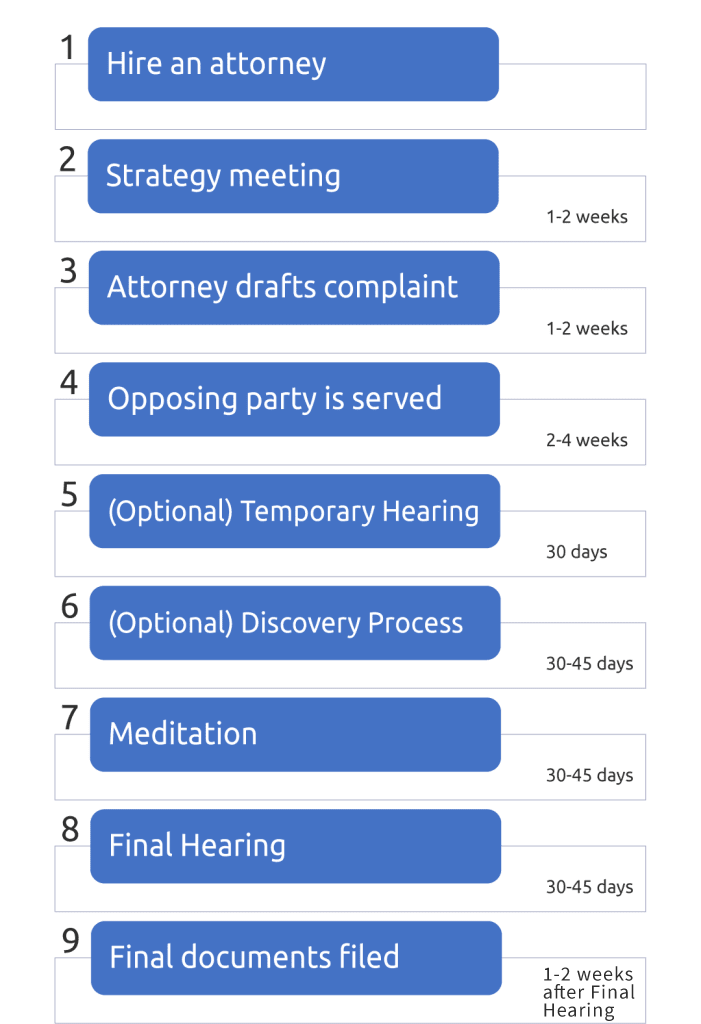The Divorce Process
Most of the people who call our office for help asking how to get a divorce in Georgia really want to know about what the divorce process looks like and how much time it will take. Every family is unique, and the process depends on whether the divorce is contested (parties do not agree on details of agreement) or uncontested (both parties amicably agree on how resources will be divided).
To help you better understand the divorce process, here is a timeline of the steps that will be taken in a typical contested divorce:

- Hire An Attorney
Beware of attorneys who give out free legal advice over the phone without knowing all the details of your specific case. Our firm does not offer a set retainer fee, because every family is different, and the initial consult will allow us to get to know your case, so we can provide a retainer fee that is appropriate for your particular matter. - Strategy Meeting With Attorney
This initial meeting is your chance to tell your attorney what your goals are. The more information you provide for this meeting – the more answers you will get. We will ask about your assets, debts, children, property, retirement accounts, pensions, property, incomes, monthly and childcare expenses, and other financial information. Your attorney will use this information to help you determine the best possible strategy for your case. - Attorney Drafts the Divorce Complaint
Based on your strategy meeting and the information you provided, your attorney will draft the complaint for divorce and other accompanying documents required by the court. - Opposing Party is Served
Once you have approved the draft, Georgia law states that a Defendant must be properly served with the complaint and summons so that the case can proceed before the court. Service of these documents can be by Acknowledgement of Service, Sheriff’s Entry of Service, Private Process Server, or by Publication (when a Defendant can’t be located.)Depending on the type of service selected, and the rules of the county in which the case was filed, this can take a couple of weeks or longer. - Temporary Hearing/Mediation
After the Defendant has been properly served, a temporary hearing can be scheduled in front of a judge, or the parties can schedule a mediation or the negotiation process between the two parties may begin. - Discovery Process
Discovery may be used when there is concern that one of the parties is not fully disclosing their financial assets. There are different types of discovery that your attorney may utilize based upon the information they are seeking. Often, this is the only way to be sure that our clients are aware of the assets for equitable division. This process typically takes 180 days from start to finish. - Mediation
Most counties require you to have mediation prior to a final hearing. Many of our clients can reach a settlement at this kind of proceeding. Typically, you and your spouse will split the cost of a professional mediator. Your attorney may choose to schedule mediation to help resolve any issues without the intervention of a Judge. You must come with a spirit of compromise! - Final Hearing
If you and your spouse could not come to an agreement during mediation, a final hearing is set and the judge will hear from both parties, review evidence and make a ruling on all issues presented before the court. If you were able to come to an agreement, depending on the county, the Petitioning spouse may have to make a brief appearance in front of a judge to finalize the agreement. Judges are typically concerned with the well-being of the children as it relates to a divorce agreement.
Some judges will allow us to request a Motion for Judgement on the pleadings, which means they will approve the document without either party having to appear in court. However, there is typically a waiting period of approximately 30 days after the agreement is signed and filed with the court.
If you and your spouse are amicable and both agree to the resolution of all issues, then your divorce in GA could be considered uncontested. If that is the case, the divorce process is the same except you most likely will not have a temporary hearing, or discovery process. Some couples can work through the divorce process, and while your attorney can not advise the opposing party, we often draft a settlement agreement and then both parties come to our office to sign it.
Contact our firm to learn more.

















